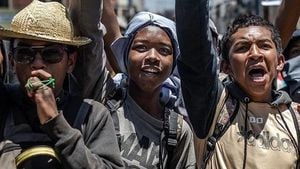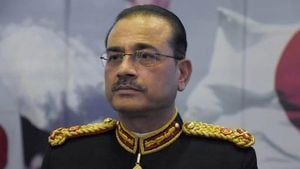MONTREAL — The New Democratic Party (NDP) is firmly backing its candidate, Craig Sauvé, as he faces backlash over a campaign flyer showcasing the Palestinian flag alongside assertions of genocide occurring within Gaza. This leaflet, promoted for the LaSalle—Émard—Verdun byelection, has ignited criticism not only from political adversaries but also from Jewish advocacy groups.
The controversy centers on the leaflet’s imagery, which prominently features Sauvé photographed against the backdrop of the Palestinian flag. Beneath this image, the flyer urges voters to support him on September 16, aiming to "stop the genocide in Gaza." The Centre for Israel and Jewish Affairs (CIJA) has condemned the leaflet, characterizing it as a "disgraceful attempt" to interject foreign conflict dynamics within Canadian politics. They argue this action undermines Canadian national values and potentially fuels antisemitism.
"The NDP has turned its back on Canada and our values, fueling antisemitism in the process," the CIJA stated emphatically through social media. Such claims point toward significant dissatisfaction within certain factions of the Canadian populace, particularly those concerned about the educational and sociopolitical consequences of depicting the Palestinian flag amid rising tensions.
Responding to the criticisms, the NDP underscored its long-standing position calling for truce and the release of all hostages taken by Hamas. They emphasized, "Craig Sauvé included the Maple Leaf on the leaflet, and he regularly poses with both the Quebec and Canadian flags, showing his respect and love for them." They dismissed the idea of any flag representation, foreign or otherwise, being equated with anti-Canadian sentiments. The party spokesperson noted this sentiment to be "ludicrous," stressing the importance of recognizing other national flags alongside the Canadian flag, especially within the current geopolitical climate.
During Monday’s discussion of the leaflet, various political figures from opposing parties expressed their disapproval. Conservative deputy leader Michelle Rempel Garner directly questioned why Sauvé prominently displayed the Palestinian flag instead of Canada's national emblem, urging the electorate to contemplate this choice's underlying reasoning.
This sentiment was echoed by Bloc Québécois leader Yves-François Blanchet, who advocated for increased caution when addressing the sensitive topics surrounding the Israel-Palestine conflict. Blanchet remarked on the importance of maintaining respect and dignity amid challenging and complex crisis situations.
"This kind of political, electoral, or ideological exploitation of symbols deeply tied to tragic real-world consequences should be approached with greater responsibility," he stressed.
Craig Sauvé is running to fill the seat left by the resigning Liberal cabinet minister David Lametti. With the byelection set for September 16, this race beckons to be the first significant electoral challenge for federal parties following the NDP’s recent decision to withdraw its support agreement from the minority Liberal government of Prime Minister Justin Trudeau. This strategic shift is pivotal considering the Liberal party’s historical stronghold over LaSalle—Émard—Verdun, now deemed increasingly vulnerable with polling data indicating it may be contested vigorously.
Speculations around the political outcome suggest the race may hinge on the sentiments generated about the war and its ramifications for constituents, particularly those who identify as Arab or Muslim. Notably, on the topic of the Gaza conflict, it has been reported by Gaza’s Health Ministry—a body facing scrutiny for its reporting accuracy—that over 40,900 Palestinians have died since the onset of the current violent conflict following Hamas's attack on Israel.
This humanitarian crisis, resulting from escalated hostilities, raises alarms and concern far beyond Palestine, extending to political landscapes across Canada and Western nations, which are grappling with how best to navigate these international dynamics without alienation among their diverse citizenry.
There’s palpable unease brewing among voters, particularly as it was recently reported—when 52 Arab and Muslim staffers within the Liberal government penned letters expressing their inability to support the party’s byelection campaign due to its perceived neglect of their values relating to the Gaza situation. Their statements resonate with broader concerns about representation and the perceived alignment—or misalignment—of political platforms with citizens' humanitarian beliefs.
The imagery used by Sauvé throughout his campaign is politically charged, generating discussions not just about national and international allegiance, but also about the ethical dimensions of political campaigning. Critics argue this occurrence reflects not only the current state's political dynamics but also societal preoccupations with how issues like these intertwine with national identity.
Political commentators view this byelection as indicative of broader public sentiment surrounding the conflict and the stances taken by parties. Should the NDP secure this position, it could signify continued support for more progressive platforms aimed at addressing global issues, including human rights. Conversely, if the Liberals or Bloc Québécois regain control, it may signify a leaning toward traditional governance strategies aligned with those of the historical political establishment.
The political essence of this situation goes beyond Sauvé’s campaigning methods; it serves as a reflection of how political discourse around international issues resonates with local electorates, particularly when those issues evoke sentiments of oppression, humanitarian crises, and global unrest.
With varying opinions on the relevance of international matters within Canadian politics, the stakes are undoubtedly high for this election. The outcome might redefine not only the political makeup of LaSalle—Émard—Verdun but also set precedents for other federal parties concerning how they address international crises on home soil.
With the byelection just around the corner, all eyes are on Montreal as members of all parties intensify their efforts to capture voter interest and deliver their messages effectively—searching for the fine line between global concerns and national identity.



